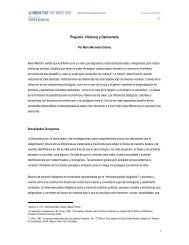Speaking Democracy: Carlos Motta's The Good Life - La buena vida
Speaking Democracy: Carlos Motta's The Good Life - La buena vida
Speaking Democracy: Carlos Motta's The Good Life - La buena vida
You also want an ePaper? Increase the reach of your titles
YUMPU automatically turns print PDFs into web optimized ePapers that Google loves.
to electoral processes. In listening to their statements, it becomes apparent to the viewer that Arendt’s well-known<br />
arguments against representative democracy have a popular echo. For Arendt, the relinquishing of day-to-day<br />
deliberation and action to a small number of holders of power destroys the “space of appearance” in which citizenship<br />
can be fully realized. 6 <strong>The</strong> recuperation of this space clearly occupies a wider political imaginary for Motta and his<br />
subjects.<br />
Political philosopher Chantal Mouffe has written extensively about the impossibility of a wholly emancipated model of<br />
representative democracy, as well as the inevitable failure of the linked idea of rational consensus in decision-making.<br />
She describes how both these concepts are inherently flawed as they stem from the universalizing concept of liberal<br />
individualism, a hegemonic viewpoint that has only increased with the tide of globalization and that effectively<br />
dismantles possibilities for collective action. 7 <strong>The</strong> idea of rational consensus—the assumption of collective agreement<br />
about a set of predetermined issues—ultimately fails to acknowledge the constantly shifting dimensions of power,<br />
social divisions and pluralities of interests and demands. Mouffe notes the way the rhetoric of consensus effaces<br />
discussion of these pluralities, particularly in the recent attempt to shift political discourse toward moral polarities<br />
instead of partisan ones (witness the increasingly popular calls for “bipartisan” coalitions to address economic issues in<br />
the US government, paired with now-ubiquitous rhetoric on “evil” and “the enemy”).<br />
Mouffe argues that citizens need the possibility of identifying with a range of democratic political identities. This<br />
diversity of identities must extend beyond a traditional liberal interpretation of pluralism, which assumes that an infinite<br />
number of voices and values that can exist harmoniously under the spirit of individualism. 8 She proposes that instead<br />
of rational consensus we need a consensus of conflict. To this end, she postulates a model that she calls “agonistic<br />
pluralism,” which incorporates an awareness of the exclusions and power struggles inherent in society, and integrates<br />
these shifting dynamics, and the identities they form, into decision-making processes. 9<br />
Motta’s multivalent project suggests such a democratic model. It presents both a multiplicity of voices, but also<br />
demonstrates how those voices coalesce into collective identifications; of nationhood, of class, of vocation, and of<br />
social and familial roles (such as the Argentinean activist group Mothers of Mayo he interviews?). By taking as its point<br />
of departure the examination of the political and social landscape created by policies of intervention, the project<br />
underscores the inevitable shaping of those identities, and of all political identities, by conflict.<br />
6 Eric Wainwright, “<strong>The</strong> Vita Activa of Hannah Arendt,” Politikon: South African Journal of Political Studies (December 1989): 27.<br />
7 Chantal Mouffe, On the Political, (New York: Routledge, 2005), 10.<br />
8 Ibid., 69.<br />
9 Chantal Mouffe, “Deliberative <strong>Democracy</strong> or Agonistic Pluralism?” Social Research (Fall 1999)<br />
4




